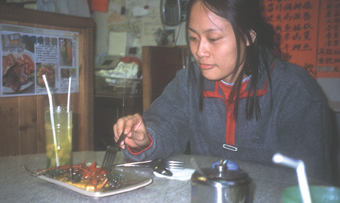Roe Chan

“Beatles and scorpions are the most popular of the insect cuisine,” said Mr. Hung Kwing Yin, chef at Thyme restaurant in Mong Kok.
Scorpions and centipedes are usually deep-fried, while cicadas and aquatic beetles are usually stir-fried with salt.
Rice bugs are usually steamed with eggs and garnish, while spiders are usually charbroiled.
“But it is not a must to follow traditional cooking methods. You can have a dish of curried scorpion or an insect cake if you want,” said he.
Colour, smell and taste are considered the three most important elements in traditional Chinese cuisine.
The appearance of insects, however, often keeps people away from the food rather than attracting them to it.
As a result, taste becomes an even more important factor for insect cuisine.
“Spiders taste like chicken while other insects have unique tastes.
“But, actually, the taste of the dish highly depends on which kinds of spices chefs use in cooking, because by themselves, the insects do not have a strong flavor,” said Mr. Hung.
It is not difficult to cook insects, but the preparation is challenging and must be done carefully, because some insects are poisonous, such as scorpions and centipedes.
“It is necessary to get rid of the poisonous parts of an insect before cooking it.
“Therefore, cooks should have the knowledge of the innards of insects and be highly skilled. Otherwise, both the chef and the diner will be in great danger,” said Mr. Hung.
In addition, insects must be boiled thoroughly in hot water.
“This is to kill all bacteria and clean out the poison before we cook the insects,” said Mr. Hung. “But danger can still exist.”
Even though he is a chef, Mr. Hung does not favour insect cuisine himself.
“Insects do not have many nutrients besides protein, and because they are usually small in size, they also do not provide much for us to eat,” said he.
He added that most people actually eat insects because they want to show their bravery rather than because they enjoy the dishes.
“Also, insect cuisine is a gimmick at restaurants to attract customers,” said he.
Mr. Hung said that insect cuisine is mainly found in Chinese culture.
Although some other cultures also have insect cuisine, they do not have as many types as that found in China.
Prof. Liang Song Ming is the principle professor in the Department of Chinese Medical Formulation at Guangzhou University of Traditional Chinese Medicine.
He said that after being cooked throughly, the poisons inside the insects are destroyed and they are therefore safe to eat.
“People eat insects because insects have nutrients and are safe. I don’t think people would eat insects if they were harmful,” said Prof. Liang.
The practice of eating insects has a long history in China.
“There have been records of eating insects since the first writings in Chinese medicine.”
But instead of cuisine, insects are usually used for medical purposes in Chinese culture.
“For example, pupas of bees and bombers contain rich protein. The latter can also stimulate sex hormones in males, which in turn enhances a male’s sexual ability,” said Prof. Liang. “Dytiscids, a kind of water beetle, are especially good for the human kidneys and are an antidiuresis.
“Children who have the problem of bed-wetting should eat them.”
Although many insects are poisonous, they can also be used as healing agents in some Chinese medical treatments.
“Eating scorpions and centipedes can help prevent from twitching and cure malignancies. Therefore, some people even regard them as a medicine for cancer,” Prof. Liang explained.
Eating insects is seen as an alternative for those who need special treatment for a disease.
“Some people even believe that cockroaches can cure cancer. It just depends on whether you are brave enough to try,” said he.